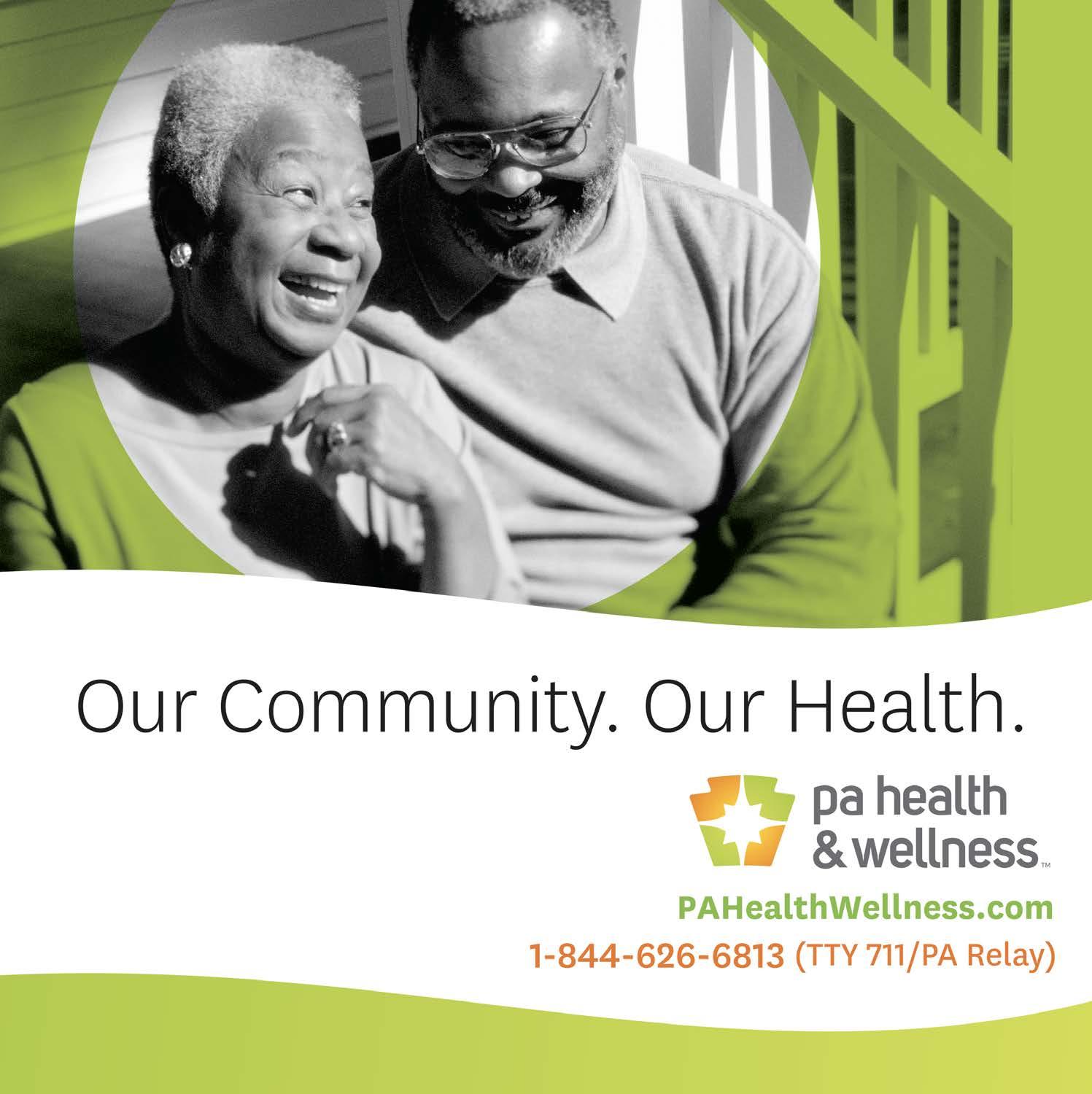GERIATRICIANS FOCUS ON WHAT MATTERS

IMPORTANT VOTING INFO

HELP AVAILABLE WITH MEDICARE



GERIATRICIANS FOCUS ON WHAT MATTERS

IMPORTANT VOTING INFO

HELP AVAILABLE WITH MEDICARE


Philadelphia Corporation for Aging (PCA) is the Area Agency on Aging for Philadelphia County and is dedicated to serving Philadelphia’s older adults and adults with disabilities.
PCA publishes Milestones and offers:
• Care in the home
• Home-delivered meals
• Home repairs and modifications
• Protective services
• Senior centers
• Caregiver support
• Veteran-directed care
• Employment and volunteer programs
• Legal services
• Transportation
• Ombudsman services
• Health education
• Information and referral

Report suspected elder abuse 24/7 to the PCA Helpline: 215-765-9040. AskHelpline@pcaCares. org
Published by Philadelphia Corporation for Aging
Najja R. Orr, DBA, FCPP President and CEO
PCA Board of Directors 2024
Glenn D. Bryan, Chair
Louis G. Colbert, Vice Chair
Satya B. Verma, O.D., Immediate Past Chair
Denise Adamucci
Wilmarie Gonzalez
Sandra McNally
Paul Nathanson
Norma D. Thomas, D.S.W.
John Whitman
Jacqueline S. Zinn, Ph.D.
Emeritus: Arthur E. Helfand, D.P.M.
Milestones is published monthly and distributed at more than 1,100 locations throughout Philadelphia.
Check us out online: pcaCares.org/ Milestones
Editor: Alicia M. Colombo 215-765-9000, ext. 5081 PCA, 642 N. Broad St. Philadelphia, PA 19130
Email: MilestonesNews@pcaCares. org
Advertising: Teresa Heavens 215-765-9000, ext. 5053
Email: Teresa.Heavens@pcaCares. org
Subscriptions & Distributions: Home delivery: $12/year
The views expressed in Milestones are not necessarily those of Philadelphia Corporation for Aging (PCA). Milestones will not knowingly accept or publish fraudulent or misleading advertising. Milestones reserves the right to edit, revise or reject ads. Milestones assumes no responsibility for errors, misprints, omissions or misinformation; for failure to publish an ad; or for any damages of any kind. Neither the publisher nor any other party is rendering expert advice in this publication. No part of this newspaper may be reproduced without the permission of PCA. ©2024 Philadelphia Corporation for Aging. All rights reserved.

By Najja R. Orr, DBA, FCPP PCA President & CEO
People of all ages should take an active role in looking after their own health. Philadelphia Corporation for Aging (PCA) helps older adults take control of their health and well-being.
PCA has many programs to support different areas of one’s life that support health, including information and resources to improve finances, education, health care, neighborhoods and community connections. These areas affect quality of life. Factors such as poverty, jobs and education have a big impact on health. According to the U.S. Department of Health and Human Services, these factors can impact up to 50% of local variations in health outcomes.
PCA wants to give older adults the tools and resources to make healthy choices. Even small changes can make a big difference in how you feel. Our programs aim to help people stay healthy, take care of themselves, and build strong social connections.
PCA’s work follows the Older Americans Act, which says that health promotion and disease prevention are important for older Americans to stay healthy and independent. We want to support older adults with home- and community-based services and supports.
Our mission is to provide services so older adults can live as independently as possible, knowing they are supported. We have been working toward this goal for over 50 years through education and support.
To advocate for your own health, you can: prepare for medical appointments by writing down your symptoms, current medications, and questions; bring someone with you to help talk to the doctor (if it would be helpful to you); and ask for clearer explanations if you don’t understand medical terms.
For more information on health advocacy, check out the article on page 4 about Dr. Ala Stanford, who was awarded the Rodney D. Williams Award for Excellence in Service and Leadership for her dedication to older people and those with disabilities.
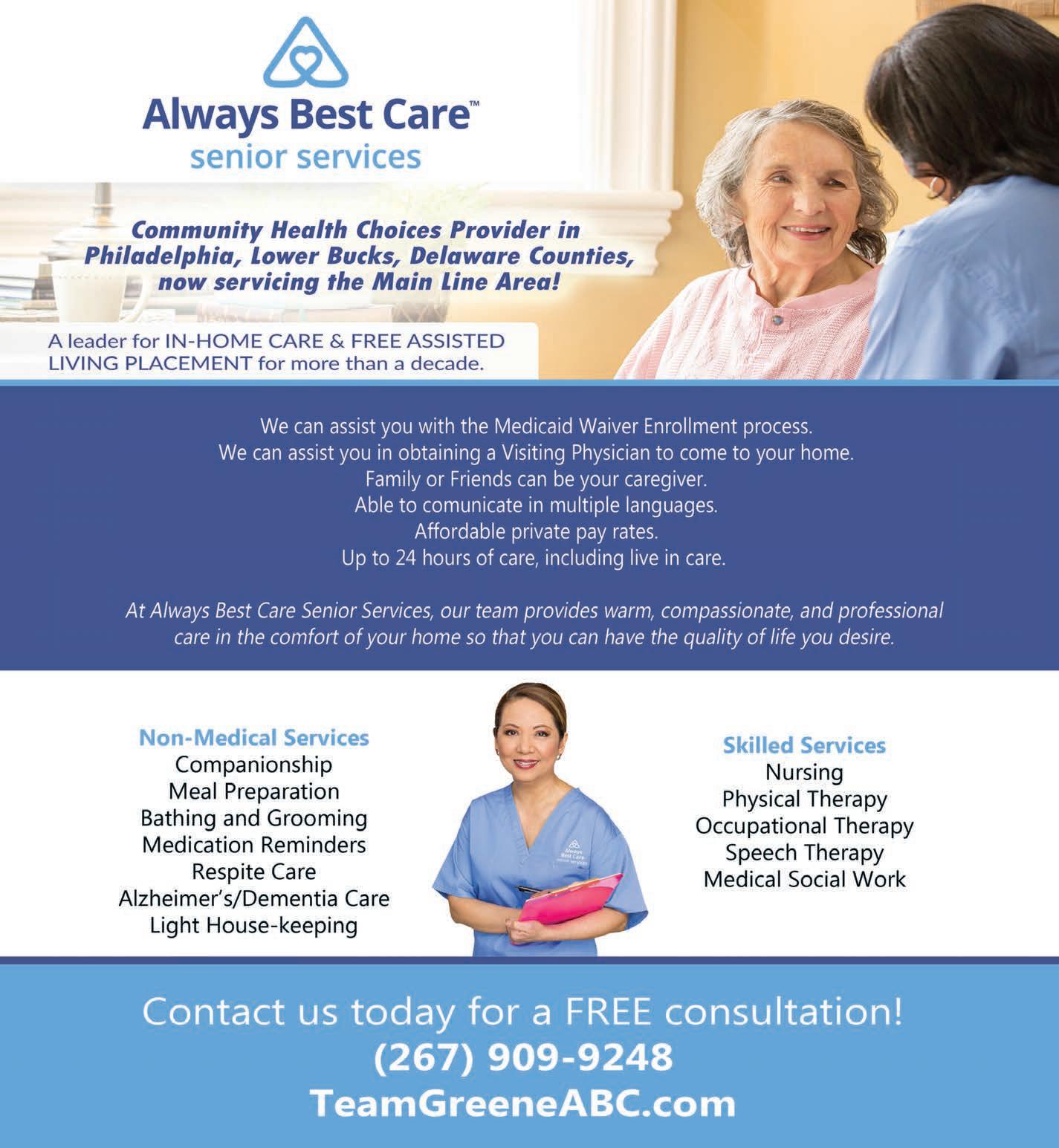
care of them like my own’

By Alicia M. Colombo
Ala Stanford, M.D., was born in North Philadelphia at Einstein Hospital to teenage parents.
“When my father went off to college and my mother went to work in the suburbs, I was left to care for myself and my younger brother,” Dr. Stanford said.
“I was most happy when I was taking care of children,” said Dr. Stanford, who became the first Black female pediatric surgeon trained entirely in the U.S. “When I was a child, I wasn’t as protected by the adults in my life as I should have been. I later discovered that when I was able to take care of children and be their comforter and protector, I was healing my younger self.”
Taking care of people has become her life’s work, as both a caregiver and a doctor. “My great-grandmom lived to be 91, and I took care of her a lot,” she said. This care included making end-of-life decisions – from where she would live to whether to have a feeding tube inserted. “I realized that, in the end, peo-
ple just want the people who love them to be around them and not to be in pain.”
Dr. Stanford is now recognized as a national leader in health equity and a health care policy from her years as an advisor to the U.S. Department of Health and Human Services. As a professor of practice at the University of Pennsylvania, with additional appointments in Perelman School of Medicine and Annenberg School of Communication, she is also working to shape the next generation of health care practitioners.
During her medical training, Dr. Stanford learned that health disparities are a major obstacle to health care equity. “My professors were saying that health outcomes weren’t good for people of color because they weren’t taking care of themselves,” she said. “They already brought that bias into the field through the classroom.”
That is why representation among health care providers matters. “Having a doctor that looks like them goes a long way to increasing quality of care,” she said. “There’s a shared cultural expe-
rience. Culturally, in Black and Latinx communities, there’s a reverence for older adults in making sure they are well cared for. When clinicians see older adults like their own family members, they take care of them accordingly.”
However, health care bias often includes ageism. “Some clinicians or health providers think that if a person is already 70, 80 or 90, then they’ve already lived a long life,” Dr. Stanford said. “So, all potential care options may not be discussed. That sometimes happens to older adults with their care delivery.”
Dr. Stanford had been a pediatric surgeon for 20 years, when the COVID-19 pandemic hit and changed everything.
“People said that African Americans have COVID at a higher rate because they don’t go to the doctor and have chronic conditions,” Dr. Stanford said. “The truth is that Blacks were being turned away. They didn’t have access to care. That’s why I jumped in to help provide comfort and care.”
Dr. Stanford gained international recognition during the COVID-19 pandemic by using the infrastructure of her pediatric surgery practice to create The Black Doctors Consortium, a grassroots organization focused on education, testing, contact tracing and vaccination in communities devoid of access to care and resources. By focusing on individuals disproportionately impacted by COVID-19, her efforts helped to serve more than 100,000 people and
saved countless lives.
“This idea that you have to wait for the money to come to do something cannot be repeated,” Dr. Stanford said. “With my savings and resources as a business owner, I was able to get us started while others were waiting for funds. It took some innovation and resourcefulness.”
When people were lined up during the pandemic for the COVID vaccine, Dr. Stanford made sure there were no older adults or people with disabilities waiting outside. “I brought them inside and gave them something to eat,” she said. “No one told me to do that. It wasn’t in a textbook. It was just the right thing to do. They never asked for anything or complained.”
Lessons learned from COVID
The pandemic put the lack of health care access in the national spotlight.
“You have to serve the vulnerable groups first,” Dr. Stanford said. “Resources need to be heav-

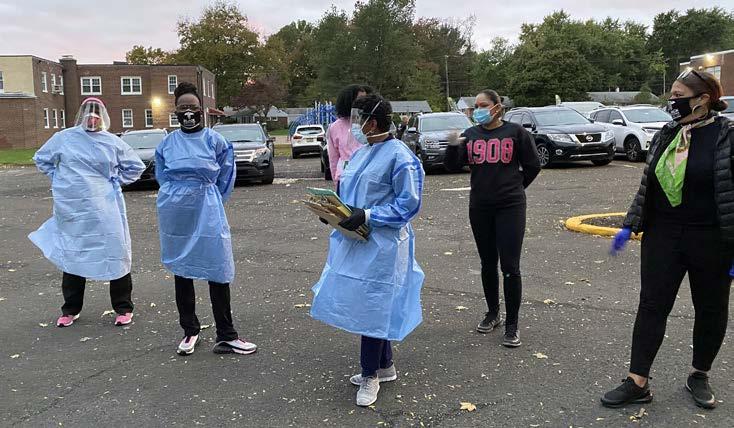
ily weighted to provide access and services to those people. You must go to them.”
This way of thinking inspired Dr. Stanford to focus her efforts on eradicating health care disparities on a larger scale. In 2021, she opened the Dr. Ala Stanford Center for Health Equity (ASHE) in a North Philadelphia community with one of the lowest life expectancies in the city. The center, located at 2001 W. Lehigh Ave., provides expert health care and improves health outcomes for Philadelphians of all ages. (For more information: 484-270-6200 | bdccares.com)
“To increase health care access, there should be more ambulatory care centers that are associated with a church or with a community center, located in neighborhoods where older adults live,” Dr. Stanford said. “It’s important to have resources centrally located in one spot – behavioral health, insurance and benefits, primary care, blood draw, EKGs and vaccines. If it’s tough for you to get transportation, you can get every-
thing done at once. That’s how to increase access and reduce health disparities.”
On Sept. 12, Philadelphia Corporation for Aging (PCA) presented Dr. Stanford with its inaugural Rodney D. Williams Award for Excellence in Service and Leadership. Both PCA and Dr. Stanford are committed to providing access to quality services through advocacy and education, as well as serving with empathy and care.
She will continue to be a trailblazer, forge new paths to advocate for the underserved and provide better health care to those who need it the most. Dr. Stanford wrote an autobiography, titled “Take Care of Them Like My Own: Faith, Fortitude and a Surgeon’s Fight for Health Justice,” to share her story with the wider public. She said: “If what you’re doing to work toward eradicating health care disparity isn’t uncomfortable, then you’re not doing enough.”
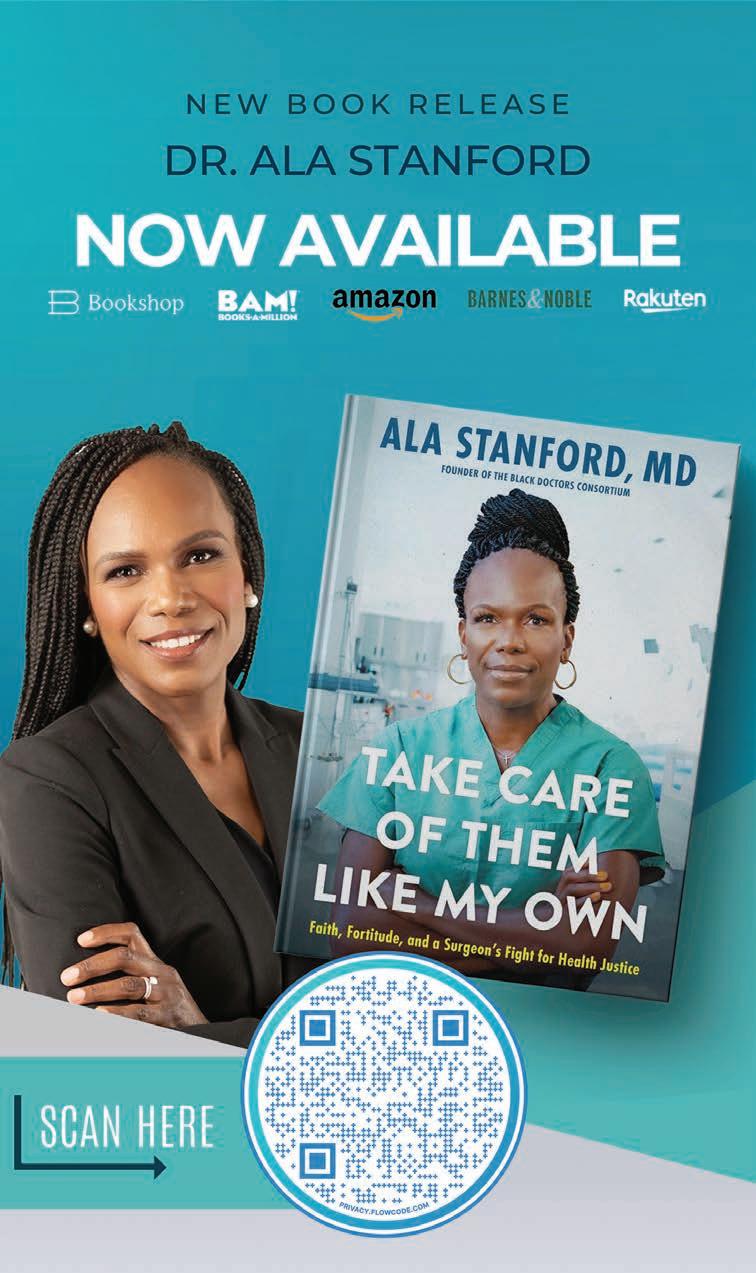
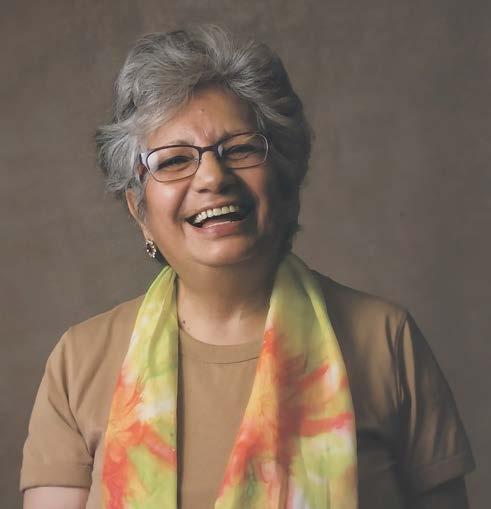
By Jay Nachman
Leticia Roa Nixon, 71, learned about social justice while studying communications at the Jesuit “Universidad Iberoamericana” (Ibero-American University) in Mexico City. “It is very important that you give back to the community after you study. You can’t remain silent or turn a blind eye when you see a situation,” said Nixon, who worked as an editor and reporter in Mexico City.
After moving to Philadelphia in 1985, Nixon became an activist on behalf of the local Hispanic community. She also began working as a news reporter for Philadelphia’s Hispanic newspapers in 1988. She currently reports for “Atrévete” (I Dare You), a bilingual online television program, and is a news director for Philatinos Radio, where she has hosted the weekly program “La Noticia con Leticia” (The News with Leticia) since 2013.
In 1999, Nixon co-founded “Casa Monarca” (Monarch House), a community center dedicated to preserving Mexican art and culture in South Philadelphia. She self-published “Aquí Estamos/Here
We Are,” a bilingual book documenting oral stories of Mexican immigrants residing in South Philadelphia.
Nixon served as an official court reporter for the Philadelphia Court of Common Pleas, retiring in 2018 after 28 years. But with battles still to be fought (and won), she hasn’t retired from her activist ways.
“These vulnerable communities need support and the voice of someone else,” said Nixon, who became a U.S. citizen in 1990.
No longer fearful of being deported because of her previous status, Nixon stepped up her advocacy activities. She joined “Juntos” (together), a community-led, Latino immigrant organization in South Philadelphia fighting for human rights for workers, parents, youths and immigrants. (For more information: 215-218-9079 | VamosJuntos.org)
“Juntos” successfully advocated for Philadelphia to end its data-sharing agreement with Immigration and Customs Enforcement (ICE), which gave ICE officials access to Philadelphia’s arrest database to target immigrants suspected of
being in the country illegally. This allowed the Latino community to feel safer, Nixon said.
The organization also helped bring awareness of the rights of immigrants through the coalition of groups that form the New Sanctuary Movement of Philadelphia, which works to end injustice against immigrants regardless of their immigration status. (For more information: 215-279-7060 | SanctuaryPhiladelphia.org)
Another accomplishment, Nixon said, has been the establishment of Latino business associations. The Dominican Grocers Association (215-223-3809 | DominicanGrocersAssociation.org) has grown from 300 members to nearly 2,000. Mexican entrepreneurs have recently formed the Association of Mexican Business Owners in Philadelphia (es-la.facebook. com/aemphilly). The Greater Philadelphia Hispanic Chamber of Commerce (215-845-5456 | PhilaHispanicChamber. org) provides workshops and resources that allow the community to prosper.
“When people are informed, they gain power,” Nixon said. “I think it’s a great achievement.”
Some of the most emotional moments for Nixon occurred when three families who had been living in sanctuary in churches received visas and were notified that they would be free from arrest or deportation. Despite the successes, challenges remain for the
Latino immigrant community. One is the traumatic experience of immigration, with the cultural shock and language barriers for newcomers. The lack of an easy pathway to citizenship is also an obstacle.
Gentrification remains a threat, particularly for the Puerto Rican community, Nixon said. She recounted how members are being uprooted from longtime enclaves in the Spring Garden and Norris Square neighborhoods. Because of these challenges Nixon will continue to work for free as a translator, as well as march and protest on behalf of Philadelphia’s immigrant communities. This commitment to advocacy, she said, “It all stems from the simple teaching of help your fellow human beings.”

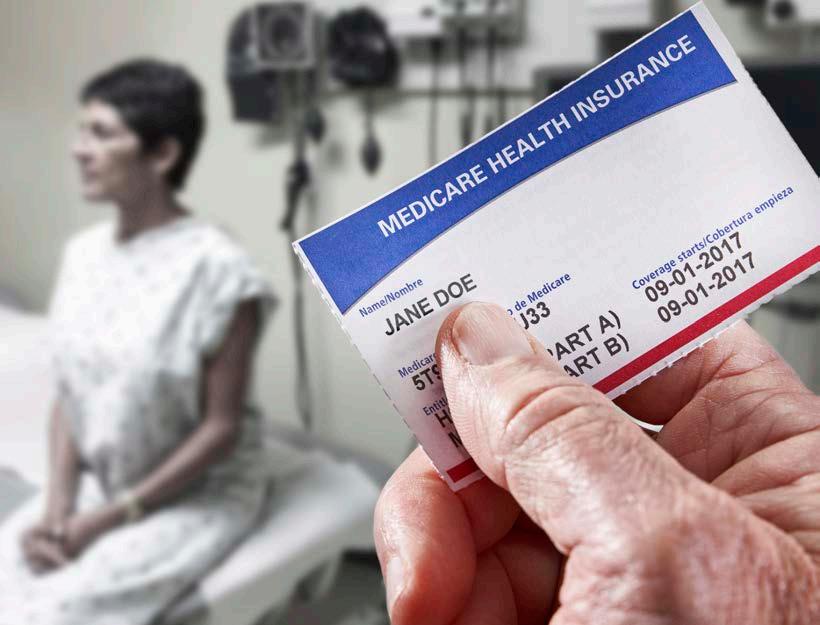
Source: Medicare.gov (Managed by the U.S. Centers for Medicare and Medicaid Services)
Medicare is health insurance for people 65 or older. You may be eligible to get Medicare earlier if you have a disability, end-stage renal disease (ESRD), or ALS (also called Lou Gehrig’s disease). Some people get Medicare automatically, others have to actively sign up – it depends if you start getting retirement or disability benefits from Social Security before you turn 65. It’s important for older adults to understand the different parts of Medicare and how Medicare works. Here is a primer on the basic components of Medicare.
Part A: Hospital insurance –Part A helps pay for inpatient care in hospitals, skilled nursing facility care, hospice care and home
health care.
Part B: Medical insurance –
Part B helps pay for services from doctors and other health care providers. These services can include outpatient care, home health care, durable medical equipment (wheelchairs, walkers, hospital beds, etc.), and preventive services (screenings, vaccines, and yearly wellness visits).
Part D: Drug coverage – Part D helps pay for prescription medications. You can join a Medicare drug plan in addition to Original Medicare, or a Medicare Advantage Plan with drug coverage. Plans that offer Medicare drug coverage are run by private insurance companies that follow rules set by Medicare.
Medicare Supplemental Insurance (Medigap)
You have the option to pur-
chase extra insurance that helps pay some additional costs of Original Medicare. Medigap policies, which are sold by a private company, are standardized so the benefits in plan are the same, no matter which insurance company sells it.
When you first sign up for Medicare and during the annual open enrollment period (Oct. 15 through Dec. 6), you can choose which way to get your Medicare coverage. The two options are Original Medicare and Medicare Advantage.
• Includes Parts A and B.
• You can join a separate Medicare drug plan (Part D).
• You can use any doctor or hospital in the U.S. that accepts Medicare.
• To help pay your out-of-pocket costs in Original Medicare (including the 20% coinsurance), you can purchase supplemental coverage, such as Medigap; use coverage from a former employer or union; or apply for Medicaid (a joint federal and state program that provides health coverage for some people with limited income and resources).
Medicare Advantage (also known as Part C)
• A Medicare-approved plan
from a private company that offers an alternative to Original Medicare for health and drug coverage. These “bundled” plans include Part A, Part B and usually Part D.
• In most cases, you’ll need to use doctors in the plan’s network.
• Plans may have lower outof-pocket costs than Original Medicare.
• Plans may offer some extra benefits that Original Medicare doesn’t cover, like vision, hearing and dental services.
For more information about Medicare, call 1-800-MEDICARE (633-4227). You can compare plans online at Medicare.gov. Philadelphia Corporation for Aging (PCA) offers free health insurance counseling, through PA MEDI, to Medicare beneficiaries: Einstein Medical Center at 215456-7600, and CARIE at 215545-5728. (See article on page 13 for more information about PA MEDI.)
(See page 15 for crossword)
October 2024
OCTOBER 1-31
BREAST CANCER AWARENESS MONTH
Free mammograms available (special criteria may apply): • Penn Medicine Breast Health Initiative (for uninsured and under-insured women): 215-454-3217 • AccessMatters (PA Breast and Cervical Cancer Early Detection Program): 215-985-2619 • Fox Chase Cancer Center Mobile Screening Unit: 215-728-3554 • Jefferson Health: 215503-9673

OCTOBER 1
INTERNATIONAL DAY OF OLDER PERSONS
Celebrate by raising awareness of issues affecting older people. It is also a day to appreciate the contributions that elders make to society. Details: un.org/en/ observances/older-persons-day
OCTOBER 1-31
HEALTH LITERACY MONTH
Become more aware of how to understand health information so you can make good health care decisions for better health outcomes. Information: HealthLiteracyMonth.org
Send your calendar items two months in advance to: MilestonesNews@pcaCares.org Questions? Call 215-765-9000, ext. 5081.
OCTOBER 3
CHAIR EXERCISE
Work out while seated or using a chair for balance to boost strength, flexibility & mental well-being. 11 a.m. Falls of Schuylkill Library. 215-685-2093 | Free
OCTOBER 4
PHILADELPHIA JAZZ TAP ENSEMBLE
Jazz up your lunch hour with a concert & dance lesson. Noon. Parkway Central Library. 215-686-5316 | Free
OCTOBER 5
ROXTOBERFEST
The 12th annual fall-themed festival will feature food trucks, live music & German folk music. 12-6 p.m. Ridge Avenue, between Lyceum and Leverington avenues. 215-5082358 | RoxboroughPA.com | Free
OCTOBER 8
FIBER ARTS GROUP
Connect socially with other creatives working on portable crafts projects. 2 p.m. Falls of Schuylkill Library. 215-685-2093 | Free
OCTOBER 9
MEDITATION CLASS
In this one-hour course, you will learn about the benefits of meditation & how to practice. 4:30 p.m. Parkway Central Library. 215-6865394 | Free
OCTOBER 10
WE ARE WHAT WE EAT
Curator-led tour of the new exhibit that explores the intersection of food, community & identity. 3 p.m. Parkway Central Library. 215-686-5394 | Free
OCTOBER 11
BILLIARDS
Play a few rounds of billiards with other older adults during weekly Pool Table Hour. 12:30 p.m. Lutheran Settlement House. 215-426-8610 | Free
OCTOBER 14
INDIGENOUS PEOPLES’ DAY

OCTOBER 15-DECEMBER 7
2025 MEDICARE OPEN ENROLLMENT
Make changes to your Original Medicare plan, Medicare Advantage plan, and/or prescription drug coverage. Coverage starts Jan. 1. See page 13. 1-800-MEDICARE | Medicare.gov
OCTOBER 15
LINE DANCING CLASS
This great form of exercise offers the opportunity to enjoy music & make friends. 10 a.m. Lutheran Settlement House. 215426-8610 | Free
OCTOBER 16
POTTERY CLASS
This class is designed to guide both beginner & experienced clay artists through the fundamental techniques of pottery. 11 a.m. Center in the Park. 215- 848-7722 | Free
OCTOBER 17
COVID RESOURCES
A representative from the Philadelphia Department of Public Health will provide tests, masks, hand sanitizer & information about vaccines. 10 a.m. Holmesburg Library. 215-685-8756 | Free
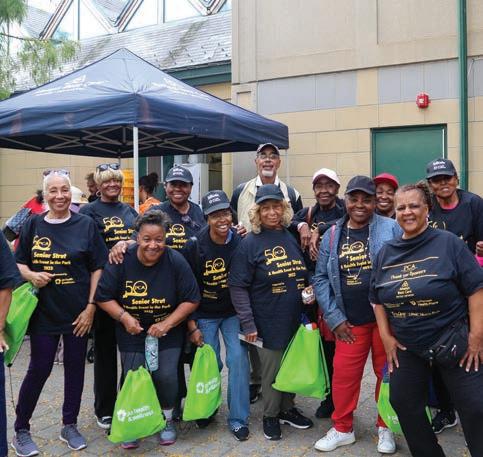
OCTOBER 18
PCA’S SENIOR STRUT
Health fair for older adults featuring music, one-mile walk, vendors, fitness stage & food. 9:30 a.m. to 12 p.m. Lloyd Hall. 215765-9000, ext. 5055 | Tickets: $5 (must be purchased in advance)
OCTOBER 21
LAST DAY TO REGISTER TO VOTE IN 2024 GENERAL ELECTION (See pg 11) 1-877-868-3772 | PaVoterServices.pa.gov)
OCTOBER 21
ENHANCE FITNESS CLASS
Exercise is a whole lot of fun in this evidencebased fitness program. Participants are led by a certified instructor in an hour-long class focused on dynamic cardiovascular exercise, strength training, balance & flexibility. 9:30 a.m. Lutheran Settlement House. 215-426-8610 | Free
OCTOBER 22
TOTAL BODY STRENGTH
Keep your energy going with a special & fun workout. Exercises will be done both sitting & standing. 10 a.m. KleinLife: Northeast Philadelphia. 215-698-7300 | Free
OCTOBER 24
POETRY CLASS
Dive into the world of words & explore the art of self-expression in a nurturing environment to craft & refine your poetic voice. 10:30 a.m. Center in the Park. 215848-7722 | Free
OCTOBER 22-24
PCA’S REGIONAL CONFERENCE ON AGING
Leaders in the aging network, including a panel of present & past state secretaries of aging, will discuss timely issues impacting older Pennsylvanians. Instructional sessions – with free Continuing Educational Units (CEUs). – cover a wide range of subjects of interest to professionals, volunteers & advocates in the aging services field. 215765-9000, ext. 5065 | pcaCares.org | $20/40 per session

OCTOBER 25
BINGO
Feeling lucky? Bingo boards & chips provided. Noon. MLK Older Adult Center. 215-685-2715 | Free
OCTOBER 29
LAST DAY TO APPLY FOR MAIL-IN OR ABSENTEE BALLOT (See pg 11)
Applications must be received by 5 p.m. Completed ballots must be received by 8 p.m. on Nov. 5. A postmark is not sufficient. 1-877-VOTESPA | PaVoterServices.pa.gov
OCTOBER 29
QIGONG CLASS
Qigong is a system of coordinated body posture, movement, breathing & meditation used to optimize energy with the goal of improving and maintaining health & wellbeing. 10:30 a.m. Center in the Park. 215848-7722 | Free
OCTOBER 30
COMPUTER CLASS
Learn the basics of using computers & internet. Computers & materials provided. 10 a.m. Martin Luther King Older Adult Center. 215-685-2715 | Free
OCTOBER 31
HALLOWEEN

By Jay Nachman
A national initiative for age-friendly care focuses on the four Ms: what matters, mentation, mobility and medication, according to the Institute for Healthcare Improvement.
“Those four Ms are what geriatricians focus on, but we’re also making sure we’re not making recommendations or treatments that adversely affect any of those,” said geriatrician Dr. Lisa Walke, chief of the Division of Geriatric Medicine at the University of Pennsylvania Perelman School of Medicine.
Geriatric care begins with determining what matters most to the patient. For example, what matters most to one older adult may be remaining independent. For another person, it may be longevity. “Depending on what matters to you, there might be a different path you go with either treatments or interventions, or things you do, because what matters to you is what’s going to drive our decision making,” said Dr. Walke.
Mentation means optimizing a patient’s brain health by making
recommendations on how to keep thinking sharp and what to avoid that might negatively impact the brain.
Regarding mobility, Dr. Walke works with patients to make sure they are as functional as possible and able to do as much as they would like and can do.
As people age, their bodies may not respond to medication the same way they did when they were younger. Because of these physiologic changes, geriatricians may decrease or deprescribe medications that are likely to have adverse effects. They may also lower the dosage or switch to a different medication.
As people live longer, there is an emphasis on living well. “We focus on wellness, not just longevity for longevity’s sake,” said Dr. Walke. “You want to live longer, while still being able to do as much as you enjoy doing and being functional.”
Increased longevity for older adults also means that geriatricians must focus on whole-person care. This might include helping older adults think about financial planning, which people wouldn’t necessarily think of as heath care. Older adults need to have enough income and resources to cover a longer lifespan. “Do they need to have long-term care insurance? If they needed (financial) assistance, how would they get it? People need to include that in their plan
for their financial well-being,” said Dr. Walke.
Older adults are the fastest-growing segment of the population. There are more than 65 million older adults and approximately 7,000 geriatricians in the country, Dr. Walke said. As longevity increases, there will be fewer doctors specializing in geriatrics to treat older adults.
To address the anticipated geriatrician shortage, the federal Geriatrics Workforce Enhancement Program funds institutions to develop programs that increase geriatric knowledge among trainees and engage older adults and family members in aging issues. “The government is trying to help expand the knowledge base of everyone as well as trying to get more people to specialize in this field,” Dr. Walke said.
The good news in the geriatrics field is that new treatments are proving helpful for treating older adults faced with dementia. Following decades of research, there are what Dr. Walke called “game-changing” treatments that may reverse the trajectory of Alzheimer’s disease. These treatments lower the amyloids, a plaque-like substance, that gets tangled in the brain and causes Alzheimer’s disease. By lowering the amyloids, these new infusion treatments may improve cognitive function.
Dr. Walke also points to artificial intelligence (AI) and other forms of technology as cutting-edge areas that will provide benefits for older adults. There are many tech companies that are investigating what
technologies can help older adults live independently in the community, she said.
“I love geriatrics because I often feel that I get more than I give in the field, and that’s what attracted me to going into the field to begin with,” Dr. Walke said. “People tend to get more generous with their wisdom and experience over the years. I have enjoyed people sharing their advice or wisdom with me, and as I’m trying to help them live their best life, they’re trying to do the same for me.”

We welcome your story ideas, feedback and suggestions. (Story-specific comments or questions will be forwarded to the writer.) Submissions of letters or articles for publication must be signed and dated and include your address and phone number. Submission constitutes permission to edit and publish in any form or medium.
Send ideas, comments & submissions to: Attn: Milestones Editor PCA, 642 N. Broad St. Philadelphia, PA 19130
Email:milestonesnews@pcaCares. org Milestones
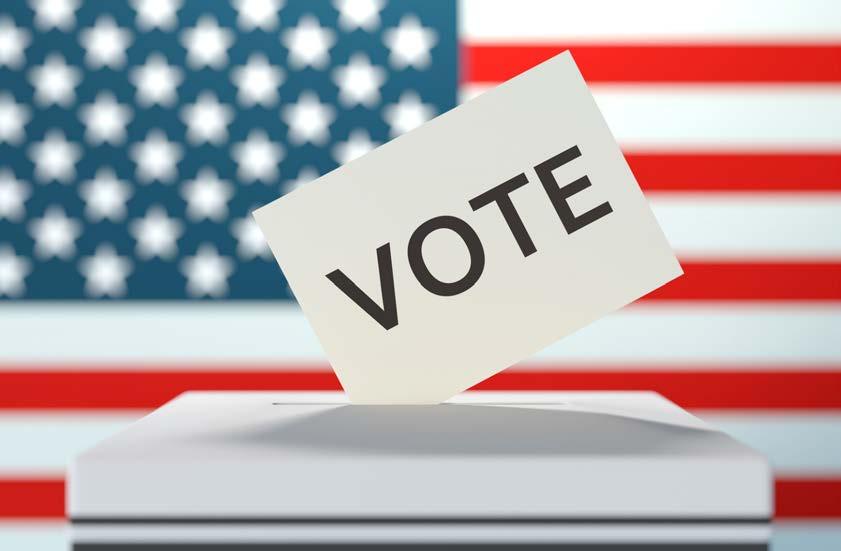
1-877-868-3772.
The next General Election will be held Tuesday, Nov. 5. Polls will be open in Philadelphia from 7 a.m. to 8 p.m.
You must be registered to vote by Oct. 21 to vote in the General Election.
To register to vote in Philadelphia, you must be:
• A citizen of the United States for at least one month before the next election.
• A resident of Philadelphia and your election district for at least 30 days before the next election.
• At least 18 years old by the date of the next election.
If you are unsure whether you are registered to vote at your current address, you can check your voter registration status online at PaVoterServices.pa.gov or call
Eligible Philadelphia residents must submit a voter registration application online, in person or by mail. People who have been convicted of a felony or misdemeanor, or are in pretrial detention, may be able to vote.
You can register to vote using the PA State Department’s online application at https://www.PaVoterServices.pa.gov/Pages/VoterRegistrationApplication.aspx. Have your Pennsylvania driver’s license or PennDOT ID card handy. If you don’t have one, you can still use the online form.
The voter registration application can be downloaded and printed in the following languages: English, Arabic, Chinese (simplified and traditional), French, Haitian Creole, Hindi, Japanese, Khmer, Korean, Portuguese, Russian,
Spanish, Tagalog and Vietnamese.
Register in person
You can register to vote at Philadelphia County Election Offices:
• Voter Registration Office, 520 N. Columbus Blvd., 5th Floor, Philadelphia, PA 19123
Enter through the Spring Garden Street entrance. Voter ID cards can be printed on-demand at this site. | Phone: 215-686-1590
• Philadelphia County Board of Elections, City Hall, Room 142, 1400 JFK Blvd., Philadelphia, PA 19107
Enter through the East or South portals | Phone: 215-686-3469
• You can also register to vote at a PennDOT photo license center when you get or update your driver’s license.
Register by mail
Voter registration applications are available at U.S. post offices, Philadelphia public libraries, state liquor stores and other state government offices. To request a voter registration application be mailed to you, call the City Commissioners Office at 215-686-1590.
Mail your completed voter registration application to: Voter Registration Office, 520 N. Columbus Blvd., 5th Floor, Philadelphia, PA 19123. Your application must be received by the voter registration deadline (Oct. 21).
Any registered voter may apply to vote by mail in the next election. You do not have to provide a reason for why you want to vote by mail ballot.
However, an absentee ballot is only for registered voters who will be outside the city on Election Day, who have an illness or physical disability that would prevent them from going to the polls, have a religious holiday or observance on Election Day, or are members of the armed forces. Voters requesting an absentee ballot must provide a valid reason for receiving the ballot.
Applications for a mail-in or absentee ballot must be received by 5 p.m. on Oct. 29. Completed ballots must be received by 8 p.m. on Nov. 5. A postmark by this date/ time is not sufficient.
Registered voters can apply for a mail-in or absentee ballot online at https://www.PaVoterServices. pa.gov using a valid PA driver’s license, PennDOT-issued photo ID, or the last 4 digits of their Social Security number.
Be sure to provide an email address with your application so you will receive ballot status notifications.
Ballots are available in the following languages: English, Spanish, Chinese (simplified and traditional) and Vietnamese. To request a paper mail-in or absentee ballot be mailed to you, call 1-877-VOTESPA.

• Understand that money put in an annuity typically is “locked” for a period of time specified in the annuity contract (usually five- to-10 years). Withdrawing some or all of the money early could result in a surrender charge.
in the client’s best interest when recommending an annuity.
Older adults should be wary of unfair business practices that can occur when purchasing an annuity, an insurance contract that exchanges a large payment amount for future, regular income payments. Annuities are often used to provide a steady stream of income in retirement.
“An annuity should always be a purchase made in the best interest of the buyer – not the agent,” said Pennsylvania Insurance Commissioner Michael Humphreys. “Older adults are often pressured into purchasing annuities they don’t fully understand. When consumers purchase an annuity that does not suit their needs, it can result in the loss of income and lack of access to their savings. We’re urging older adults to educate themselves on annuities and remind them to remain vigilant against aggressive or predatory agents.”
Inappropriate sales practices can occur when shopping for an annuity. The Pennsylvania Insurance Department (PID) encourages older adults to do the following when shopping for an annuity that is in their best interest.
• Read the material and ask questions.
• Pay attention to optional features offered with annuities, and get information about additional fees associated with adding benefits.
• Utilize the free look period. Read and understand the terms of the contract. If you decide the terms are not favorable, you can cancel the contract and receive all of your money back during the free look period.
Consumers should not:
• Feel pressured into buying an annuity after receiving a free lunch, dinner or gift. Consumers are not required or obligated to buy anything in these instances.
• Write the check out to the agent or producer. The check should be addressed to the company issuing the annuity.
• Accept verbal assurance. The policy terms should always be verified in writing.
• Work with an agent who is unwilling or unable to provide credentials.
The PID addresses inappropriate annuity sales practices. Pennsylvania law, Act 99 of 2021, requires agents to put the needs of clients first and to act
Since 2023, PID has helped Pennsylvanians recover more than $2 million by assisting with free look period reviews and assuring proper payment of annuity proceeds. In one particularly egregious case, PID was able to get more than $130,000 returned to an older Pennsylvanian who was sold an annuity, without the presence of the consumer’s preferred financial advocate, that clearly wasn’t in the consumer’s best interest.
“Financial exploitation has become the number one type of reported abuse against older adults in Pennsylvania,” said Pennsylvania Secretary of Aging Jason Kavulich. “Because these cases take many forms and are often more complex, investigators are rarely able to get back all the money taken from
the older adult, which is why education and prevention are so important. Older Pennsylvanians have worked hard and have been active in their communities all their lives. They should live with the dignity and respect that we all deserve, and we all must do what we can to ensure that an older adult’s assets do not fall into the wrong hands.”
Consumers who wish to file a complaint against a producer or agent selling annuities may visit PID’s website at insurance.pa.gov/consumers or contact PID’s Consumer Services Bureau at 1-877-881-6388.
Suspected elder abuse, including financial exploitation, can be anonymously reported 24/7. For Philadelphia residents, call the PCA Helpline at 215765-9040. For other Pennsylvanians, call the statewide reporting helpline at 1-800-490-8505.
and
Extended mammogram hours on Wednesdays until 7:00 p.m. and on Saturday, October 19th from 8:00 a.m. to 12:00 p.m.




By Bill Conallen
October marks the beginning of Medicare open enrollment, during which state health insurance programs (SHIPs) nationwide help Medicare-eligible individuals to evaluate their coverage options for the upcoming year. Pennsylvania’s SHIP program, Pennsylvania Medicare and Decision Insight (PA MEDI), offers confidential, objective and easy-to-understand information about Medicare, Medicare Advantage Plans, prescription drug plans, Medicare Supplement plans and appeals. This information, provided by a team of trained health insurance counselors, enables Medicare beneficiaries to compare plans and costs to find the best fit for their needs.
The PA MEDI program provides free health insurance counseling services to anyone who qualifies for Medicare, regardless of age or income. Philadelphia Corporation for Aging (PCA) offers PA MEDI services to Medicare beneficiaries in Philadelphia through partnerships with CARIE and Einstein Medical Center. This year, PCA
expects to assist more than 1,000 Medicare-eligible residents during the annual open enrollment period, which runs from Oct. 15 through Dec. 7. During this time, those eligible for Medicare can receive informed and personalized guidance based on a range of health and financial factors.
“Volunteer counselors are essential to the success of the PA MEDI program, greatly enhancing its capacity,” said Lynda Pickett, PCA’s assistant director of volunteer services. “Many volunteers find fulfillment in assisting beneficiaries as they transition to Medicare. They are a vital resource for Medicare beneficiaries, helping them navigate the various available options. Their dedication exemplifies how volunteer efforts can positively impact daily life.”
The program’s services are provided through Pennsylvania’s 52 Area Agencies on Aging by a network of trained counselors, many of whom are volunteers. Many PA MEDI counselors began as Medicare beneficiaries with questions or
concerns about their coverage.
After receiving assistance through PA MEDI, they wanted to share their knowledge to help others explore their options. PA MEDI counselors receive comprehensive training on Medicare, Med-
icaid, Medicare Advantage (an alternative to the original Medicare program, known as Part C), Medigap (Medicare supplemental insurance), Medicare prescription drug coverage, appeals, fraud and more.
“Medicare beneficiaries often find the available money-saving options confusing, and many might not learn about them without the PA MEDI program,” said Deena Pollock, a PA MEDI counselor at Einstein Medical Center. “By working individually and confidentially with beneficiaries, we can identify their health care preferences, which has allowed
(Continued on Page 14)

(Continued from page 13)
us to successfully meet the needs of many individuals. I’ve witnessed numerous cases where our comprehensive and personalized approach has saved Medicare beneficiaries hundreds of dollars each month.”
The program strives to meet beneficiaries’ needs with an impartial and personalized approach. PA MEDI counselors thoroughly assess each participant’s unique needs to recommend the most suitable options. This allows beneficiaries to easily review and compare their options; enroll in new plans; and determine eligibility for Medicare cost-savings programs, including
PACE, Extra Help and the Medicare Savings Program.
Medicare-eligible beneficiaries in Philadelphia can schedule a free health insurance counseling session by calling the following PA MEDI providers: Einstein Medical Center at 215-456-7600, and CARIE at 215-545-5728.
If you are interested in becoming a PA MEDI volunteer in Philadelphia, contact Lynda Pickett, PCA’s assistant director of volunteer services, at 215-765-9000, ext. 5104.
Bill Conallen is the public relations specialist at Philadelphia Corporation for Aging.
Philadelphia Corporation for Aging (PCA), publisher of Milestones, has received the prestigious SAGECare credential, which is a testament to its unwavering commitment to providing an inclusive and affirming environment for LGBTQ+ older adults.
SAGECare awarded PCA this credential after a rigorous assessment of policies, practices and staff training to create an inclusive and welcoming space for all people, regardless of sexual orientation or gender identity.
The SAGECare credential process evaluates aging services organizations based on various criteria, including non-discrimination policies, staff training on
LGBTQ+ cultural competency, community engagement and support services. By meeting and exceeding these standards, PCA has demonstrated its commitment to promoting a diverse and supportive environment for LGBTQ+ older adults.

Informational and enrollment events are being held throughout Philadelphia from October 15 through December 7 2024 with trained PA Medi (Medicare Education Decision Insights) counselors to assist you.
While making health insurance and prescription drug coverage decisions for 2025, be sure to consider applying for extra help (Low-income Subsidy). Call one of these numbers provided below:
Einstein Medical Center: 215-456-7600 Center for Advocacy for the Rights and Interests of Elders (CARIE): 215-545-5728
To see what events are being held in your area: http://pda-apprise.org/meetings

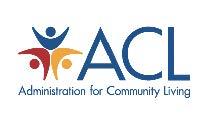

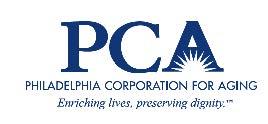
Funded wholly or in part by the Administration for Community Living
PA MEDI is the State Insurance Assistance Program for Pennsylvanians 60 and older. The state Department of Aging created PA MEDI to help older adults understand their health insurance options and make the best decisions about their insurance needs.
Brief
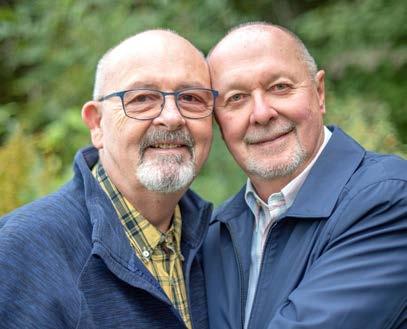
The AHA recommends that LGBTQ+ elders discuss their heart disease risk factors with their health care professional, as well as have their cholesterol and blood pressure checked regularly. The following tips from the AHA can help anyone improve their heart health and should be adopted by anyone with heart disease risks, including LGBTQ+ older adults.
Quit substances: Do not use tobacco products, and drink alcohol only in moderation.
Crossword
Cardiovascular disease remains the leading cause of illness, disability and death globally, despite advances in medicine. LGBTQ+ elders face greater risks of cardiovascular disease, heart attacks and strokes than the general older adult population. This may be due to prolonged stress, chronic medical conditions and other social/ environmental factors.
The American Heart Association (AHA) underscores the significance of enhancing cardiovascular health among LGBTQ+ adults. AHA identified exposure to psychosocial stressors throughout life and unhealthy coping mechanisms as key contributors to cardiovascular health disparities in the LGBTQ+ community.
Research has shown an increased risk for heart attacks and strokes among transgender women, as well as an increased risk for blood clots among transgender individuals. It is important to speak with your physician about these risks prior to starting gender-affirming hormone treatment.
Be active: Aim for 2 ½ hours of moderate physical activity each week. Manage weight: The optimal Body Mass Index (BMI) is below 25.
Control cholesterol: High levels of non-HDL (or “bad”) cholesterol can lead to heart disease.
Watch blood sugar: Over time, high levels of glucose (blood sugar) can damage your heart, kidneys, eyes and nerves.
Manage blood pressure: Levels less than 120/80 are optimal. High blood pressure is defined as 130-139 systolic (top number) or 80-89 diastolic (bottom number).
Eat healthy: Aim for a healthy eating pattern that includes whole foods, fruits and vegetables, lean protein, nuts, seeds, and cooking in non-tropical oils, such as olive and canola.
According to SAGE, “to support their health, we must educate, promote regular medical care, and empower advocacy. This ensures LGBTQ+ elders’ needs are respected and addressed.”
For more information, go to the site sageusa.org.
